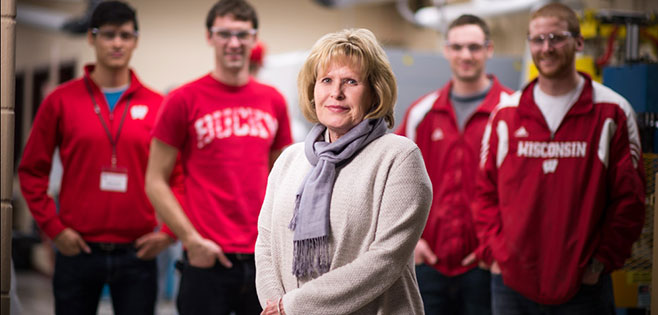
If you ask Mechanical Engineering Professor Roxann Engelstad how engineering in the 21st century has evolved, her answer is one of both challenge and opportunity. “It moves so fast, it is hard to keep up,” said Engelstad, who holds the Stephen P. Timoshenko and the Bernard A. and Frances M. Weideman professorships. In response to increased global competition and convergence of disciplines, the National Academy of Engineering (NAE) in 2004 called for a new model for engineering education. The NAE “Engineer of 2020” will be the product of a design-heavy curriculum. Rather than focusing on single aspects of a problem, this new engineer will be a systems engineer, with the ability to take into account policy and social practice as well as foundational science.
As traditional engineering departments look for ways to adapt their curricula to produce these engineers, the Department of Mechanical Engineering is benefiting from a $1.5 million gift from 1958 mechanical engineering alumnus Robert “Bob” Cervenka and his wife, Debbie. The gift is funding crucial new equipment purchases for undergraduate teaching labs.
Bob Cervenka co-founded Phillips Plastics in 1964 and served as its chief executive officer and chairman, while Debbie Cervenka worked as executive vice president and member of the board of directors until they sold the company in 2010. Seeking a way to give back, the Cervenkas settled on updating manufacturing, measuring and other lab equipment, which Debbie Cervenka said goes to the heart of what mechanical engineering is, and what the Department actually needed.
Engelstad put the gift to work enhancing the Department’s already strong hands-on curriculum and speeding its entry into the new era of engineering. In addition to updating labs with faster, smarter or more precise tools, the gift has helped the Department add new dimensions to existing courses.
In a quest to instill an innovative spirit in mechanical engineering students, the Department is offering more experience in design-oriented thinking. Building on new hands-on opportunities enabled by the Cervenkas’ gift, the Department is laying the foundation for an entirely new leg of the formerly three-legged curriculum. Where once mechanical engineering covered only mechanical systems, energy systems and manufacturing systems, it now includes design, innovation and systems engineering.
[ar12]
